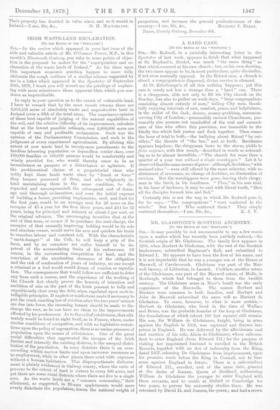IRISH WASTE-LAND RECLAMATION. ero THE EDITOR OF THE ' 4 SPECTATOR.")
the review which appeared in your last issue of the able and valuable article of Mr. O'Connor Power, M.P., in this month's Niseteeath Century, you refer to some points of objec- tion in the proposal he makes for the "expropriation and re- clamation of the waste lands of Ireland." As his ideas upon this important economic question happen to more fully elaborate the rough 'outlines of a similar scheme suggested by me in a letter which appeared in the Spectator of September 20th, 1879, I trust you will accord me the privilege of explain- ing with more minuteness those apparent blots which you con- demn as impracticable.
In reply to your question as to the extent of culturable land, I have to remark that by the most recent returns there are 4,653,551 acres of absolutely waste and unproductive land. in Ireland (over a fifth of the total area). The unanimous opinion of those best capable of judging of the natural capabilities of the soil, and the relative difficulty of its improvement, calculate that at the lowest possible estimate, over 2,000,000 acres are capable of easy and profitable reclamation. Such was the opinion of the Parliamentary Commission, and such is the judgment of every experienced agriculturist. By alloting this extent of now waste land in twenty-acre parcelmentf3 to the landless 'abseiling population or dependless cottier class, over 100,000 families or 500,000 persons would be comfortably and wisely provided for, who would thereby cease to be an ineumbrance as paupers or a disturbance as agitators. If the problematical claims of a proprietorial class who nobly kept these lands waste since by "fraud or force" they became possessed of them, and who religiously in- tend maintaining them in the same condition, be dis- regarded and uncompensated, the subsequent cost of drain- age and thorough reclamation, and even the initial expense of building a house, providing implements, seed, and food for the first year, would he an average rent for 20 acres on the occupier of £5 a year for the first three years, and I:14 for 32 years, being for principal and interest at about 5 per cent. on the original advance. The encouraging incentive that at the end of that term, or sooner if he purchase the rent-charge, the occupier of that annually improving holding would be its sole and absolute owner, would nerve his arm and quicken his brain to ceaseless labour and constant toil. With the characteristic " earth-hunger " of the Celt, he will keep a grip of the farm, and by no conscious act suffer himself to be de- prived of the accumulating fruits of his endeavours. Of course, in the surrounding competition for land, and the conviction. of the unrelenting sternness of the obligation and the risk of confiscation of years of industry, no one except a criminal or a fool would would dream of evasion or repudia- tion. The consequences that would follow are sufficient to doter any from such a course, and the experience of the working of the Church Act clearly proves the honesty of intention and ambition of aim on the part of the Irish peasant to fully and expeditiously clear away the debt, when regulated upon such in- telligible principles. If neglect or misfortune made it necessary to put the cruel, exacting law of eviction after the two years' arrears are due into force, the incoming tenant should be made to dis- charge the rent, as he can have no claim to the improvements effected by his predecessor. As to the evil of subdivision, that ulti- mately would be found to right itself, as in France, where, under similar conditions of occupation, and with no legislative restric- tions upon the policy of segregation, there is no undue pressure of Population upon the means of subsistence. One of the great social difficulties that aggravated the ravages of the Irish famine and intensify the existing distress, is the unequal clietri- butiou of the population. In some districts there is an over- crowding within narrow limits and upon narrower resources as to employment, while in other places there exist wide expanses without a human habitation. This disproportionate disburse i - ment s plainly evidenced in Galway county, where the ratio of persons to the extent of land is sixteen to every 100 acres, and yet there are some rural districts where there are five to a single acre. As the waste lands are a "common commodity," their allotment, as suggested, in 20-acre applotments would more evenly distribute the population, lessen the national weight of pauperism, and increase the general productiveness of the country.—I am, Sir, &c., illation J. KELLY.
Tuam, County Galway, December 9th.






































 Previous page
Previous page